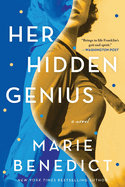
In Her Hidden Genius, Marie Benedict once again illuminates a woman overlooked by history, as she did with the neglected brilliance of Hedy Lamarr in The Only Woman in the Room and Mileva Maric in The Other Einstein. Benedict's sixth novel presents an accessible story of physical chemist Rosalind Franklin's breakthrough DNA discoveries, as well as her bold presence in male-dominated mid-20th-century science.
Despite her family's pleas, Franklin leaves postwar London in 1947 for Paris--"a place where the Nazis... once governed," her father laments--to work as a researcher with X-ray crystallography. Her lifelong mantra guides her: "Focus on the science." Though her research is successful and Paris is "the only place" she ever "fit in," an awkward romance with a colleague prompts her return to London. She thrives in the King's College lab but endures misogyny and disrespect, addressed as "Miss Franklin" or the dismissive "Rosy" rather than "Doctor." More disturbing are the obvious appropriations of her work, groundbreaking photographic evidence of her helix theory, by fellow scientists seeking to claim the discovery of the structure of DNA. In fact, three of her peers won the 1962 Nobel Prize for DNA research; she was not acknowledged.
"I am a scientist, first and always," Franklin declares, but she was also a good friend, a loyal daughter and an enthusiastic hiker. Benedict (The Mystery of Mrs. Christie) presents a complex woman, while foreshadowing her fatal illness--suggesting her strong work ethic led to dangerous X-ray exposure. Her Hidden Genius is an overdue testimony to a fascinating scientist. --Cheryl McKeon, Book House of Stuyvesant Plaza, Albany, N.Y.

